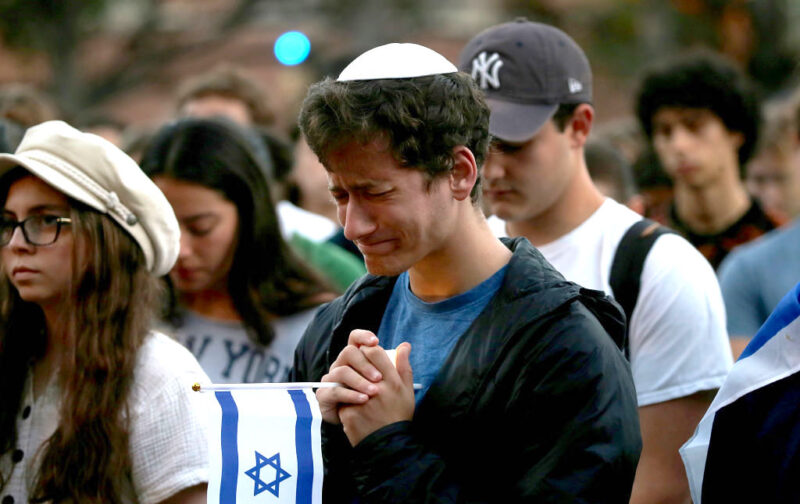Survey says
Hillel: More than a third of Jewish college students report hiding their identity since Oct. 7
Talia Dror, a junior at Cornell who addressed members of the House Committee on Ways and Means on Wednesday about her experience on campus since Oct. 7 told eJP on Monday that the results of Hillel’s poll are “not surprising at all”

(Luis Sinco / Los Angeles Times)
Jewish students attend an evening vigil in support of Israel following the Oct. 7 terror attacks at the University of Southern California on Oct. 10, 2023.
More than one in three Jewish college students say they have felt the need to hide their Jewish identity on campus since Hamas’ Oct. 7 attack on Israel, according to a survey published by Hillel International on Monday.
The poll, which included 300 Jewish college students, found that the Israel-Hamas war is influencing students in several ways. More than four out of five (84%) said that the situation is affecting them, more than two-thirds (68%) said they were sad, and most (54%) said they were scared.
One in three Jewish students (35%) said there have been acts of hate or violence against Jews on campus. A majority of those surveyed said they are unsatisfied with their university’s response to those incidents.
The survey was released a week after the U.S. Department of Education’s Office for Civil Rights opened discrimination investigations into half a dozen academic institutions in the wake of a wave of antisemitism complaints, including at Cornell University where last month a student threatened to murder and rape Jewish students.
Talia Dror, a junior at Cornell, who addressed the House Committee on Ways and Means last week about her experience on campus since Oct. 7, said the results of Hillel’s survey are “not surprising at all.”
“[I’ve] received death threats on campus. Of course students are scared… but it varies campus by campus. Cornell’s administration initially released a statement [after Oct. 7] comparing loss of lives in the Middle East to an earthquake,” Dror, the vice president of finance for the Cornellians for Israel group, told eJewishPhilanthropy.
“As a [Hillel] student leader, I can say that across the country we are seeing people justifying terrorism as a form of resistance. You are seeing clubs, students and professors glorifying the actions of Hamas,” said Dror, an industrial and labor relations major. “It’s the same Hamas that in their charter is supposed to kill all Jews worldwide. When you have students on campus glorifying the actions of a terrorist group that recently killed people you are related to or friends with, there is absolutely cause for feeling uncomfortable on campus.”
“The Jewish community, Hillel International and Hillels on campus have done as much as they can given the situation. Hillel is not supposed to come in and solve antisemitism. They’re supposed to provide a platform for Jewish community on campus,” she continued.
Adam Lehman, president and CEO of Hillel International, also testified at the campus antisemitism hearing last week. Regarding Hillel’s poll, he said in a statement, “The hate that fueled Hamas’ attack on Israel has rapidly spread to college campuses, leaving Jewish students feeling both unsupported and unsafe. And the data show that it’s getting worse. At a time when Jewish students need to feel safe, supported, and protected by university presidents and administrations more than they ever have before, Hillel International is working day and night to ensure universities are taking concrete actions to protect Jewish communities on campuses.”
The survey was conducted online by Benenson Strategy Group on behalf of Hillel between Nov. 14 and 15.












